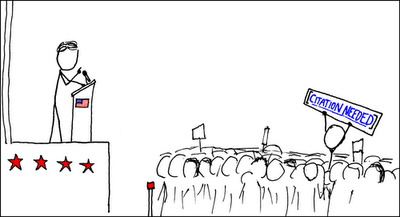Friday, August 24, 2007
 Controversy abounds after newspapers pick up on Wikiscanner and uncover a serious of 'interesting' edits from 'interesting' institutions. The Herald reports that staff from the Department of Prime Minister and Cabinet have been editing Wikipedia pages, removing material that be damaging to the Government. Opposition leader, Kevin Rudd has criticised Prime Minister John Howard for "engaging public servants to change Wikipedia" rather than personal political staff.
Controversy abounds after newspapers pick up on Wikiscanner and uncover a serious of 'interesting' edits from 'interesting' institutions. The Herald reports that staff from the Department of Prime Minister and Cabinet have been editing Wikipedia pages, removing material that be damaging to the Government. Opposition leader, Kevin Rudd has criticised Prime Minister John Howard for "engaging public servants to change Wikipedia" rather than personal political staff.Premier of NSW, Morris Iemma is also under fire after it was discovered that someone from within the NSW Premier's Department removed a reference to a controversial outburst made by Iemma in a media conference last year.
WikiScanner, which credits itself for "creating minor public relations disasters, one company at a time" has been utilised to spot some interesting 'salacious edits':
- A Dell employee insisting that visitors 'get an apple'.
- Someone from Pepsi removing the section on 'long term health effects' of Pepsi.
- Exxon underplaying the effects of its oil spill.
Wikiscanner is a searchable database linking anonymous edits on Wikipedia (where IP addresses are displayed in lieu of a username) to organisations with the associated IP address. Issues have been raised with the fact that it can't be evidenced that the IP was used with authorisation.
If you take a look at the Wikipedia entry for Wikiscanner you can see that no one is without safe (BBC reporting on edits, The Times then reporting on edits by BBC staff etc).
Wikiscanner brings an interesting layer of transparency to Wikipedia, and could be useful tool if the results it shows are reliable. Some organisations have already started banning employees from using Wikipedia (this deals with some of the more embarrassing edits). I suspect that others may start using other tools to ensure that edits can not be traced back to them - and continue whitewashing regardless.
Update: 'The best of recent edits' here.
(Pictured: "Wikipedian Protester", Randall Munroe - via his excellent webcomic xkcd, available under a Creative Commons Attribution-NonCommercial 2.5 license)
Comments:
Links to this post:
<< Home
Ben Bildstein said:
Another perspective:
First, cool topic, and I'm glad this is being done by someone, and also glad it's a hacker (*envy*!). But I want to play devil's advocate here, as it were, with respect to the examples.
Apple: Okay, that's clearly vandalism. I can't defend that.
Pepsi: that section should have been deleted. It was not citing sources, and clearly very biased. For example, who were the nutritionists that were asserting these things? And why is pepsi any worse than any other softdrink or candy for causing diabetes? As a sometimes editor of Wikipedia, it's obvious to me that the removed section was not neutral, as it should have been, and I agree with removing it.
Exxon Valdez: Again, the removed content was biased and unverified. When specific numbers are quoted like this ("up to 22 orcas" killed, for example), there should always be a reference to a reliable source backing this up. In fact, in controversial issues like this, it is more appropriate to quote the source rather than present it as fact. In this case, the reader is essentially expected to take the statements on face value, which is just not how Wikipedia works.
I don't have a problem with people with a conflict of interest contributing to Wikipedia, as long as it doesn't introduce systematic bias, and as long as they comply with the guidelines, like a neutral point of view, no original research, and citing sources.
Post a Comment
Another perspective:
First, cool topic, and I'm glad this is being done by someone, and also glad it's a hacker (*envy*!). But I want to play devil's advocate here, as it were, with respect to the examples.
Apple: Okay, that's clearly vandalism. I can't defend that.
Pepsi: that section should have been deleted. It was not citing sources, and clearly very biased. For example, who were the nutritionists that were asserting these things? And why is pepsi any worse than any other softdrink or candy for causing diabetes? As a sometimes editor of Wikipedia, it's obvious to me that the removed section was not neutral, as it should have been, and I agree with removing it.
Exxon Valdez: Again, the removed content was biased and unverified. When specific numbers are quoted like this ("up to 22 orcas" killed, for example), there should always be a reference to a reliable source backing this up. In fact, in controversial issues like this, it is more appropriate to quote the source rather than present it as fact. In this case, the reader is essentially expected to take the statements on face value, which is just not how Wikipedia works.
I don't have a problem with people with a conflict of interest contributing to Wikipedia, as long as it doesn't introduce systematic bias, and as long as they comply with the guidelines, like a neutral point of view, no original research, and citing sources.
Links to this post:
<< Home


